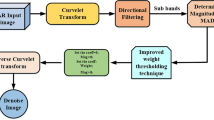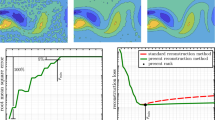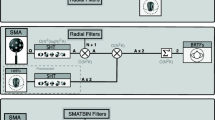Abstract
A stereophonic acoustic system offers better spatial realism in teleconferencing and other acoustic applications compared to its monophonic counterpart. However, it suffers from acoustic echo, which is inevitable in acoustic systems. In literature, several stereophonic acoustic echo cancellation (SAEC) techniques have been proposed under the assumption that the echo path is linear. However, electronic components introduce nonlinearities into the system, which renders the effect of the echo canceller to diminish in SAEC. As a result, there exists a scope to investigate further the problem of SAEC when the system is affected by nonlinear distortions. Kernel-based adaptive filtering techniques have been explored for nonlinear system identification in literature due to their superior performance compared to their linear counterparts. Hence, in this paper, we propose a family of kernel-based adaptive filtering algorithms for nonlinear SAEC (NSAEC). Although the kernel approach evidently entails an increase in computational complexity, it is a modest concession since the proposed algorithms show an average of 3–4 dB gain in echo return loss enhancement compared to their non-kernelized counterparts. Among the family of kernel-based algorithms proposed in this paper, the block sparse-based approach depicts better echo cancellation performance. Therefore, the convergence and the steady-state analyses of the kernelized block sparse-based NSAEC are presented in this paper. Computer simulations are presented comparing the proposed kernelized variants to their non-kernelized counterparts using speech and colored noise signals inputs.











Similar content being viewed by others
Data availability statement
Data sharing not applicable to this article as no datasets were generated or analysed during the current study.
References
Allen JB, Berkley DA (1979) Image method for efficiently simulating small-room acoustics. J Acoust Soc Am 65(4):943–950
Aronszajn N (1950) Theory of reproducing kernels. Trans Am Math Soc 68(3):337–404
Benesty J, Paleologu C, Gänsler T, Ciochină S (2011) A perspective on stereophonic acoustic echo cancellation, vol 4. Springer, Berlin
Benesty J, Gay SL (2002) An improved PNLMS algorithm. In: 2002 IEEE international conference on acoustics, speech, and signal processing, vol 2. IEEE, pp II–1881
Breining C, Dreiscitel P, Hansler E, Mader A, Nitsch B, Puder H, Schertler T, Schmidt G, Tilp J (1999) Acoustic echo control. An application of very-high-order adaptive filters. IEEE Signal Process Mag 16(4):42–69
Cecchi S, Romoli L, Peretti P, Piazza F (2010) A combined psychoacoustic approach for stereo acoustic echo cancellation. IEEE Trans Audio Speech Lang Process 19(6):1530–1539
Comminiello D, Scarpiniti M, Azpicueta-Ruiz LA, Arenas-Garcia J, Uncini A (2013) Functional link adaptive filters for nonlinear acoustic echo cancellation. IEEE Trans Audio Speech Lang Process 21(7):1502–1512
Duttweiler DL (2000) Proportionate normalized least-mean-squares adaptation in echo cancelers. IEEE Trans Speech Audio Process 8(5):508–518
Fazel A, El-Khamy M, Lee J (2019) Deep multitask acoustic echo cancellation. In: INTERSPEECH, pp 4250–4254
Gil-Cacho JM, Signoretto M, van Waterschoot T, Moonen M, Jensen SH (2013) Nonlinear acoustic echo cancellation based on a sliding-window leaky kernel affine projection algorithm. IEEE Trans Audio Speech Lang Process 21(9):1867–1878
Halimeh MM, Huemmer C, Kellermann W (2018) Nonlinear acoustic echo cancellation using elitist resampling particle filter. In: 2018 IEEE international conference on acoustics, speech and signal processing (ICASSP). IEEE, pp 236–240
Halimeh MM, Huemmer C, Kellermann W (2019) A neural network-based nonlinear acoustic echo canceller. IEEE Signal Process Lett 26(12):1827–1831
Hänsler E, Schmidt G (2006) Topics in acoustic echo and noise control. Springer, Berlin
Hofmann C, Guenther M, Huemmer C, Kellermann W (2016) Efficient nonlinear acoustic echo cancellation by partitioned-block significance-aware Hammerstein group models. In: 2016 24th European signal processing conference (EUSIPCO). IEEE, pp 1783–1787
Hofmann C, Huemmer C, Kellermann W (2014) Significance-aware Hammerstein group models for nonlinear acoustic echo cancellation. In: 2014 IEEE international conference on acoustics, speech and signal processing (ICASSP). IEEE, pp 5934–5938
Hong J (2018) Stereophonic acoustic echo suppression for speech interfaces for intelligent tv applications. IEEE Trans Consum Electron 64(2):153–161
Ikram MZ (2014a) Non-linear acoustic echo cancellation using cascaded Kalman filtering. In: 2014 IEEE international conference on acoustics, speech and signal processing (ICASSP). IEEE, pp 1320–1324
Ikram MZ (2014b) Non-linear acoustic echo cancellation using cascaded Kalman filtering. In: 2014 IEEE international conference on acoustics, speech and signal processing (ICASSP). IEEE, pp 1320–1324
Kar A, Swamy MNS (2017) Tap-length optimization of adaptive filters used in stereophonic acoustic echo cancellation. Signal Process 131:422–433
Lee CM, Shin JW, Kim NS (2014) Stereophonic acoustic echo suppression incorporating spectro-temporal correlations. IEEE Signal Process Lett 21(3):316–320
Liu J, Grant SL (2015) Proportionate adaptive filtering for block-sparse system identification. IEEE/ACM Trans Audio Speech Lang Process 24(4):623–630
Liu W, Principe JC, Haykin S (2011) Kernel adaptive filtering: a comprehensive introduction, vol 57. Wiley, New York
Liu J, Liu Q, Grant SL, Zheng YR (2016) The block-sparse proportionate second-order volterra filtering algorithms for nonlinear echo cancellation. In: 2016 IEEE international workshop on acoustic signal enhancement (IWAENC), pp 1–5. https://doi.org/10.1109/IWAENC.2016.7602945
Lu W, Zhang L (2019) Collaborative block-delay Volterra filters for nonlinear acoustic echo cancellation. Appl Acoust 156:83–91
Messini M, Djendi M (2019) A new adaptive filtering algorithm for stereophonic acoustic echo cancellation. Appl Acoust 146:345–354
Morgan DR, Hall JL, Benesty J (2001) Investigation of several types of nonlinearities for use in stereo acoustic echo cancellation. IEEE Trans Speech Audio Process 9(6):686–696
Park J, Chang JH (2014) Frequency-domain Volterra filter based on data-driven soft decision for nonlinear acoustic echo suppression. IEEE Signal Process Lett 21(9):1088–1092
Recommendation IT (2001) Perceptual evaluation of speech quality (pesq): an objective method for end-to-end speech quality assessment of narrow-band telephone networks and speech codecs. Rec ITU-T P 862
Romoli L, Cecchi S, Piazza F (2017) Multichannel acoustic echo cancellation exploiting effective fundamental frequency estimation. Speech Commun 86:97–106
Sankar S, Kar A, Burra S, Swamy MNS, Mladenovic V (2020) Nonlinear acoustic echo cancellation with kernelized adaptive filters. Appl Acoust 166:107329
Schrammen M, Kühl S, Markovich-Golan S, Jax P (2019) Efficient nonlinear acoustic echo cancellation by dual-stage multi-channel Kalman filtering. In: ICASSP 2019-2019 IEEE international conference on acoustics, speech and signal processing (ICASSP). IEEE, pp 975–979
Vaerenbergh SV et al (2016) A split kernel adaptive filtering architecture for nonlinear acoustic echo cancellation. In: 2016 24th European signal processing conference (EUSIPCO). IEEE, pp 1768–1772
Valero ML, Habets EA (2016) Insight into a phase modulation technique for signal decorrelation in multi-channel acoustic echo cancellation. In: 2016 IEEE international conference on acoustics, speech and signal processing (ICASSP). IEEE, pp 519–523
Zhao H, Yu Y, Gao S, Zeng X, He Z (2014) Memory proportionate apa with individual activation factors for acoustic echo cancellation. IEEE/ACM Trans Audio Speech Lang Process 22(6):1047–1055
Acknowledgements
The authors would like to thank the anonymous reviewers and the editorial team for their valuable suggestions in improving the quality manuscript.
Author information
Authors and Affiliations
Corresponding author
Ethics declarations
Conflict of interest
The authors declare that they have no conflict of interest.
Additional information
Publisher's Note
Springer Nature remains neutral with regard to jurisdictional claims in published maps and institutional affiliations.
Rights and permissions
About this article
Cite this article
Burra, S., Sankar, S., Kar, A. et al. A family of split kernel adaptive filtering algorithms for nonlinear stereophonic acoustic echo cancellation. J Ambient Intell Human Comput 14, 9907–9924 (2023). https://doi.org/10.1007/s12652-021-03647-2
Received:
Accepted:
Published:
Issue Date:
DOI: https://doi.org/10.1007/s12652-021-03647-2




